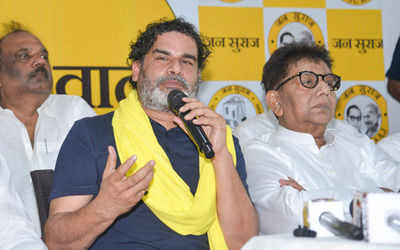
The air was thick with expectation at the News9 Global Summit in Stuttgart, Germany, as the who’s who of the German manufacturing sector gathered in a riveting panel discussion on ‘German manufacturing: Never failing, always strong’. Dr Christian Fiebig, Partner, Digital Advisory at MHP; Thomas Fischer, Chairman of the Supervisory Board, Mann+Hummel; and Matthias Lapp, CEO of Lapp Holding AG, gathered for a chat, adeptly moderated by R Sridharan, Editor-International, TV9, to tackle one question: Can the German manufacturing sector remain unshakably strong in an era of disruption?
Dr. Christian Fiebig, Partner, Digital Advisory, MHP, in conversation with News9’s @r_sridharan at #News9GlobalSummit2025 on “German Manufacturing: Never Failing, Always Strong” pic.twitter.com/5mFW6AAxIv
— News9 (@News9Tweets) October 9, 2025
Sridharan opened by inviting the panellists to assess German manufacturing’s current standing. Fischer asserted that Germany remains “the harbour of manufacturing,” but admitted the winds are changing. “Markets now lie beyond our borders… India, Southeast Asia, and Africa. In the past, we built technology and could export it; now we must reach the customer, co-create solutions, and listen more.” He placed India centre stage: its cultural influence, talent pool, and ‘frugal engineering’ ethos can catalyse a new German edge.
#News9GlobalSummit2025 | Thomas Fischer, Chairman of the Supervisory Board, MANN+HUMMEL, says “India, with its rich cultural influences—if we can harness your problem-solving abilities, we can elevate German manufacturing to the next level.”@r_sridharan pic.twitter.com/JNcmbuSlGj
— News9 (@News9Tweets) October 9, 2025
Sridharan lightened the mood by complimenting Fischer’s attire, which drew a gracious joke and a segue to the next speaker. Lapp offered a more personal arc: “Our entry into India was born of family intuition, not spreadsheets. Over the decades, we grew three advanced hubs, now designing and packaging cable compounds in India for export. But 98% is local for local. Crucially, about 80% of what we sell there is invented in India, for India.”
#News9GlobalSummit2025 | Matthias Lapp, CEO, LAPP Holding AG, shares how the company started their business in India as he speaks to News9’s @r_sridharan pic.twitter.com/ebIgf3pyvT
— News9 (@News9Tweets) October 9, 2025
Fiebig was asked how Mittelstand firms can remain competitive while decarbonising. He argued that sustainability must be integral to supply chains, not an add-on. Transparency, real-time visibility, scenario planning, and modular strategies (not “one size fits all”) are the guardrails for resilience in an uncertain world.
On de-risking China exposure, Fischer urged diversification, not decoupling. For his parts and filter business, most of the demand is local. However, he added that India is fast becoming a third pillar: to tap its talent, its global trade reach (notably in Africa), and to drive factory digital transformation. China remains relevant in automotive, though Fischer sees India rising in high-tech and digital facets over the next decade.
On being asked how cables escape commoditisation, Lapp said, “We compete not just on product, but service, responsiveness and customer intimacy. In India, buyers want a premium for a low price. So we must differentiate not only on features, but on outcome and support.” His tone acknowledged the price pressures many face there.
When the conversation turned to adoption of smart factories and Industry 4.0, Fiebig noted progress, but flagged legacy systems and data silos as blockers. MHP’s “software-defined manufacturing” model (decoupling software from hardware) gives German firms agility: new features by software push, rather than full rebuilds.
On patenting and innovation, Fischer shifted his view: innovation must be customer-driven, not just technology-driven. He praised Mittelstand for shaking off its legacy more nimbly and urged Indian-German talent synergies to fuel new competitive edges. Lapp echoed the need, warning of looming retirements, and said that his company is aggressively recruiting globally or opening remote roles to younger engineers from India. Robotics and automation will be a third leg (alongside hiring and remote work) to fill gaps.
Supply chain volatility is a shared concern. Fischer rejected reshoring: growth lies abroad. Smart factories that can flex to “lot size one” and modular sourcing will mitigate future shocks. Lapp praised regional set-ups: “We’ve long followed a local-for-local model. Our challenge is copying knowledge fast across geographies, using AI to scale proven practices.” He also conjectured that German pride sometimes impedes adoption: accepting ideas from elsewhere can be a strength, not a weakness.
Finally, Sridharan asked the panellists to look 10–15 years ahead. Fischer said Germany must lean into mobility, medical technology, clean environment, especially in fast-polluting regions abroad, where the need is desperate. Lapp placed his bet on factory automation, connectivity and hardware scale, plus renewable energy systems. Fiebig closed by emphasising quality, deep specialisation and global cooperation, anchored in engineering and innovation. “Don’t spread too thin. Play to what made us strong,” he urged.
The discussion ended with applause, not certainty, but a shared conviction: German manufacturing can continue to lead, provided it listens, adapts, and builds bridges to the world.
-
Bihar election: Jan Suraaj releases 1st list of candidates; docs, ex-bureaucrats among nominees (Ld)

-
Vegetarian Passenger Chokes To Death After Being Served Non-Veg Meal On Qatar Airways Flight; Family Sues Airline For Negligence

-
'If he made a noise...' cruel wife poured boiling oil on sleeping husband's neck and filled the wounds with red chillies

-
Gujarat: Auto manufacturing output jumps 22 times in 15 years

-
Gujarat: Auto manufacturing output jumps 22 times in 15 years
